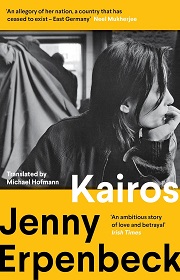Berlin. 11 July 1986. They meet by chance on a bus. She is a young student, he is older and married. Theirs is an intense and sudden attraction, fuelled by a shared passion for music and art, and heightened by the secrecy they must maintain. But when she strays for a single night he cannot forgive her and a dangerous crack forms between them, opening up a space for cruelty, punishment and the exertion of power. And the world around them is changing too: as the GDR begins to crumble, so too do all the old certainties and the old loyalties, ushering in a new era whose great gains also involve profound loss.
From a prize-winning German writer, this is the intimate and devastating story of the path of two lovers through the ruins of a relationship, set against the backdrop of a seismic period in European history.
Jenny Erpenbeck was born in East Berlin in 1967. New Directions publishes her books The Old Child & Other Stories, The Book of Words, and Visitation, which NPR called "a story of the century as seen by the objects we've known and lost along the way."
The award-winning translator Michael Hofmann has also translated works by Jenny Erpenbeck, Gert Hofmann, Franz Kafka, Heinrich von Kleist, and Joseph Roth for New Directions.
You need to log in to Rate the book
Review
Erpenbeck is adept at exploring big subjects via the intimate relationships between people... [Kairos is] a clear-eyed book, morally neutral and the more interesting for it.--The New Republic "Rumaan Alam"
Erpenbeck is among the most sophisticated and powerful novelists we have. Clinging to the undercarriage of her sentences, like fugitives, are intimations of Germany's politics, history and cultural memory. It's no surprise that she is already bruited as a future Nobelist...I don't generally read the books I review twice, but this one I did.--Dwight Garner "The New York Times"
One of the bleakest and most beautiful novels I have ever read... Erpenbeck never reaches for the stock phrase or the known response...[her] rigorous and uncompromising imagination is invigorating all the way to the final page.--Natasha Walter "The Guardian"
The weight of history, the particular experiences of East and West, and the ways in which cultural and subjective memory shape individual identity has always been present in Erpenbeck's work. She knows that no one is all bad, no state all rotten, and she masterfully captures the existential bewilderment of this period between states and ideologies.--Anna Katharina Schaffner "Times Literary Supplement"
Ms. Erpenbeck has proved time and time again that she is a fearless, astute examiner of a country's soul.-- "Economist"
A detailed, complicated and sometimes perverse six-year love affair tracks the growing maturity of the young woman, the moral decline of her lover and the last years of East Germany.--Steven Erlanger "The New York Times"
In Erpenbeck, Germany has a rare national writer whose portrayals of a ruptured country and century are a reminder that novelists can treat history in ways that neither historians nor politicians ever could, cutting through dogma, fracturing time, preserving rubble.--Gal Beckerman "The Atlantic"
A novel that pushes deep into the evanescent gap between public and private lives.--Bethanne Patrick "Los Angeles Times"
Erpenbeck presents the intimate and the momentous with equal emphasis, so that personal and historical time run on nearly parallel tracks, until they have no choice but to converge.--Robert Rubsam "The Washington Post"
Erpenbeck has an unsurpassed gift for showing how our ideas, passions and choices are shaped--and reshaped--by passing time and the ceaseless transformations of history.--Lily Meyer "NPR"
One of Germany's finest contemporary writers.--Claire Messud "The New York Times"
The most prominent and serious German novelist of her generation.--James Wood "The New Yorker"































